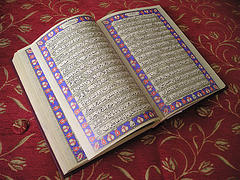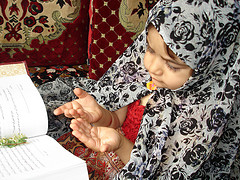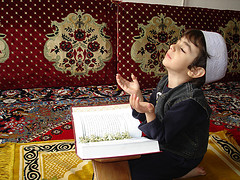
For a long time the Kurds have identified as Kurdish, but back in the seventh century A.D., the Kurds were converted to Islam and are mostly orthodox Sunni Muslims of the Shafi’i school, (everyculture.com, 2008). Shafi’i is one of the four schools of Sunni Islam and is considered one of the most conservative of the four schools. Shafi’i is followed throughout the Ummah, and is the school of thought followed by roughly 15% of Muslims, (economicexpert.com/a/shafi’i.htm, 2009). The Kurds however, are more than just Sunni Muslims. There are smaller groups that are Shia, some Christians, and some Jewish Kurds as well, (everyculture.com, 2008). As most Kurds are Muslim, I will cover the religion of Islam in great detail and relay how it affects the day to day lives of Kurdish people.

Lalish: Ezidian's Holy Temple
The Kurds, like many peoples of the Middle-Eastern region of the world, are followers of Islam in majority, as previously stated. Following the teachings of Islam, there are rules for lifestyle, and holidays. Before understanding how Kurds live under Islam, the religion must be explained. Islam is a religion that is built around Allah, who is the Supreme Being, and loving one another; much like Christianity.
One of the most important parts of Islam is the Qur’an. This is the holy text of the faith which provides instructions on family life, politics, community, and church; the Qur’an is basically the guide to life in the Islamic world, (Fisher, 2002). Like other Muslims, Kurds follow the teachings of the Qur’an. As mentioned above, most Kurds, like most all Muslims are Sunni, in which they believe in elected caliphs which are predecessors to the prophet, (Fisher, 2002). Sunnis view the caliph as the leader of worship and administrator of Shari’ah law, (Fisher, 2002).

Qur'an
Shari’ah law, throughout the Ottoman Empire was carried out through religious courts, but upon its demise, the mullah’s are the only clerics left.
For the Kurds, these figures now provide religious instruction and lead ceremonies on a very municipal level, (everyculture.com, 2008). The influence of the mullah’s is earned through good works and no longer guaranteed, (everyculture.com, 2008).

There are two traditions in Islam, Sufism and Jihad or The Five Pillar of Jihad, (Fisher, 2002). Sufism is referred to as the mystic inner tradition of Islam.
According to Fisher, Sufis have considered themselves corrective to orthodoxy and therefore shunned by other Muslims, (Fisher, 2002), including Kurds. A very famous group of Sufis’ is the Dervish group. Dervishes are poor with no possessions and are considered holy men, (Fisher, 2002).
The Kurds are known to have a group of holy men called the Shuyukh. These holy men are leaders of religious brotherhoods and retain prestige as such. These brotherhoods are known as Sufi or Dervish orders. Shuyukh perform miracles and use such miracles as proof of their status as a “favorite of God”, (everyculture.com, 2008). The miracle making is believed to continue after death, (everyculture.com, 2008). ‘Before the emergence of modern political parties, Dervish orders in Kurdistan-the Qadiri and the Nagshibandi brotherhoods-provided a basis for a level of organization wider than the tribe, but independent of the state’, (everyculture.com, 2008). Because of their role in society, shuyukh performed important functions as mediators after the fall of the emirates, (everyculture.com, 2002).
The other tradition is the Five Pillars of Jihad. The Kurds follow the Five Pillars and according to Fisher,”…specifies patterns for worship (known as the Five Pillars of Islam) as well as detailed prescriptions for social conduct, to bring remembrance to God in every aspect of daily life and practical ethics into the fabric of society.” The five Pillars are considered God’s commandments and a Muslim is obligated to live life by these rules, (Fisher, 2002).
The First Pillar of Islam is Belief and Witness. This Pillar is for Muslims to accept that ‘there is no god, but God, and Muhammad is the messenger of God, (Fisher, 2002). It is a Muslims duty to spread the teachings of Muhammad and provide information to others without any means of coercion, so they may be able to make an informed and willing decision to follow or not follow Islam, (Fisher, 2002).
Daily Prayer with sand or water in the direction of Mecca five times per day is the Second Pillar. Repeating the prayer multiple times throughout the day is believed to strengthen one’s bond with God, (Fisher, 2002). The Third Pillar of Zakat is spiritual tithing. It is obligatory for Muslims to give 2.5% of their accumulated wealth to need Muslims annually, Fisher, 2002). Though few Kurds are Shia, it is the Shia belief to give one-fifth of accumulated wealth to the imam, or prayer-leader, (Fisher, 2002). The Fourth Pillar is the mandatory fast during Ramadan, although many fasts are recommended for Muslims, (Fisher, 2002). All Muslims who are not menstruating, nursing children, not infirm or sick, but are beyond puberty are demanded to fast on a drawn-to-sunset abstention from food, drink, sex, and smoking for the entire month of Ramadan, (Fisher, 2002).
The Fifth Pillar is Hajj, or the Holy Pilgrimage to the holy city, Mecca. All who can possible make the pilgrimage are expected to do so at least once in their lifetime, (Fisher, 2002). The pilgrimage begins in Mecca at the Great Mosque, and after circling the Ka’bah the pilgrims stop in Mina. After that, they pray from noon until evening in the Arafat Valley and from there to the three pillars, they collect stones to cast at the three pillars which represent the devil. Upon returning to the Great Mosque and once again circling the Ka’bah seven times, pilgrims walk between the hills near the Great Mosque and drink from the sacred spring, Zun-Zun, (Fisher, 2002).

According to my interview source, there is a lottery to decide who goes on the pilgrimage because there are so many applicants. A set number of individuals from each Muslim country is allowed to make the pilgrimage. In addition, the day before the feast, a cow is killed and its meat is distributed among the poor, (Interview with Bahar Aran).
As with any religion, there are holidays. Of course the most important of the holidays is Ramadan. Ramadan is a holiday celebrated on the ninth month of the Islamic calendar. It is a time in which Muslims are expected to enhance their spiritual purification through fasting, self-sacrifice, and prayer, (holidays.net, 2009). The holiday that follows is known as the feast of Ramadan. This is a three day feast which follows Ramadan. The feast begins with a huge meal of dinner foods served during the day prepared by Muslim women. According to Mrs. Aran, during the three days of this celebration, relatives visit one another and make amends for any misunderstandings that may have occurred during the year, (Interview with Bahar Aran). Everyone has new clothes and when the visits to relatives are conducted, it is customary to take deserts to offer as a gift, (Interview with Bahar Aran).
Based on my interview with Mrs. Aran, there is a holiday celebrated by the Kurds that resembles Halloween, called Barat. The children do not dress up on this day in contrast to the more western tradition. Another holiday celebrated is called the Birth of Muhammad. In the Kurdish tradition, it is customary to pray numerous times throughout the day and incents are lit to commemorate the occasion, (Interview with Bahar Aran).
Death Practices are very important in the Kurdish tradition. Kurdish funerals take place immediately after death. The body of the deceased is washed by someone of the same gender, wrapped in white cotton and covered with a prayer rug. The body is then carried to the mosque and blessed according to Shafi’i rite. The bodies are buried facing Mecca with rocks marking the head and feet. Like in most other cultures, friends and relatives visit the mourning family to pay their respects, (everyculture.com, 2008).

Funeral Procession
Kurds celebrate seasons that facilitate celebrations for strengthening social bonds and making marriage arrangements. It is also a Kurdish tradition to celebrate what is called the Kurdish New Year, called Newroz. This day is celebrated on the Twenty-first day of March and commemorates the people’s rebellion against the unjust rule of the king. During this celebration, fires are lit on mountaintops and in villages, then a feast follows, which is in turn followed by a mourning celebration for the dead, (everyculture.com, 2008).